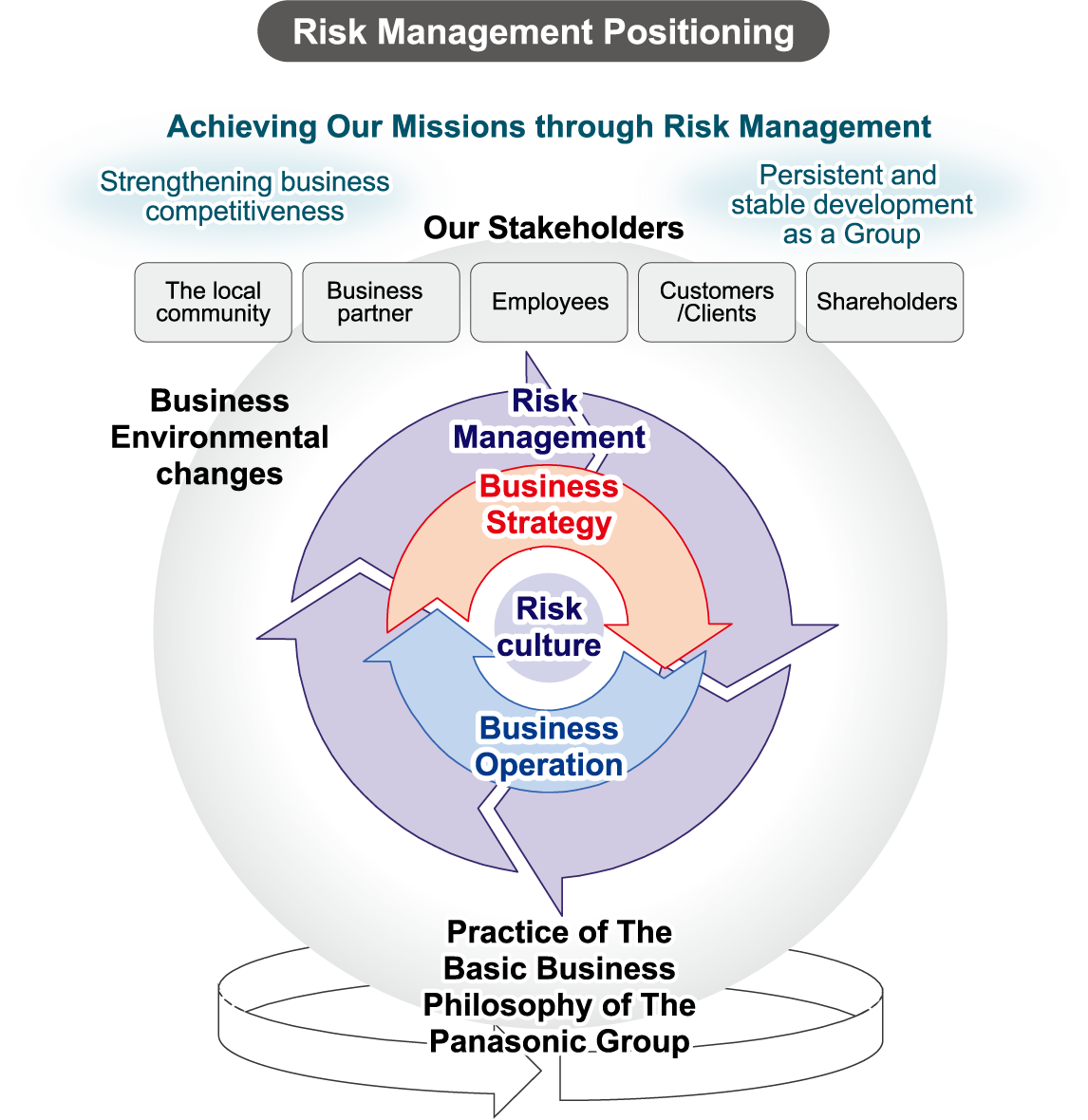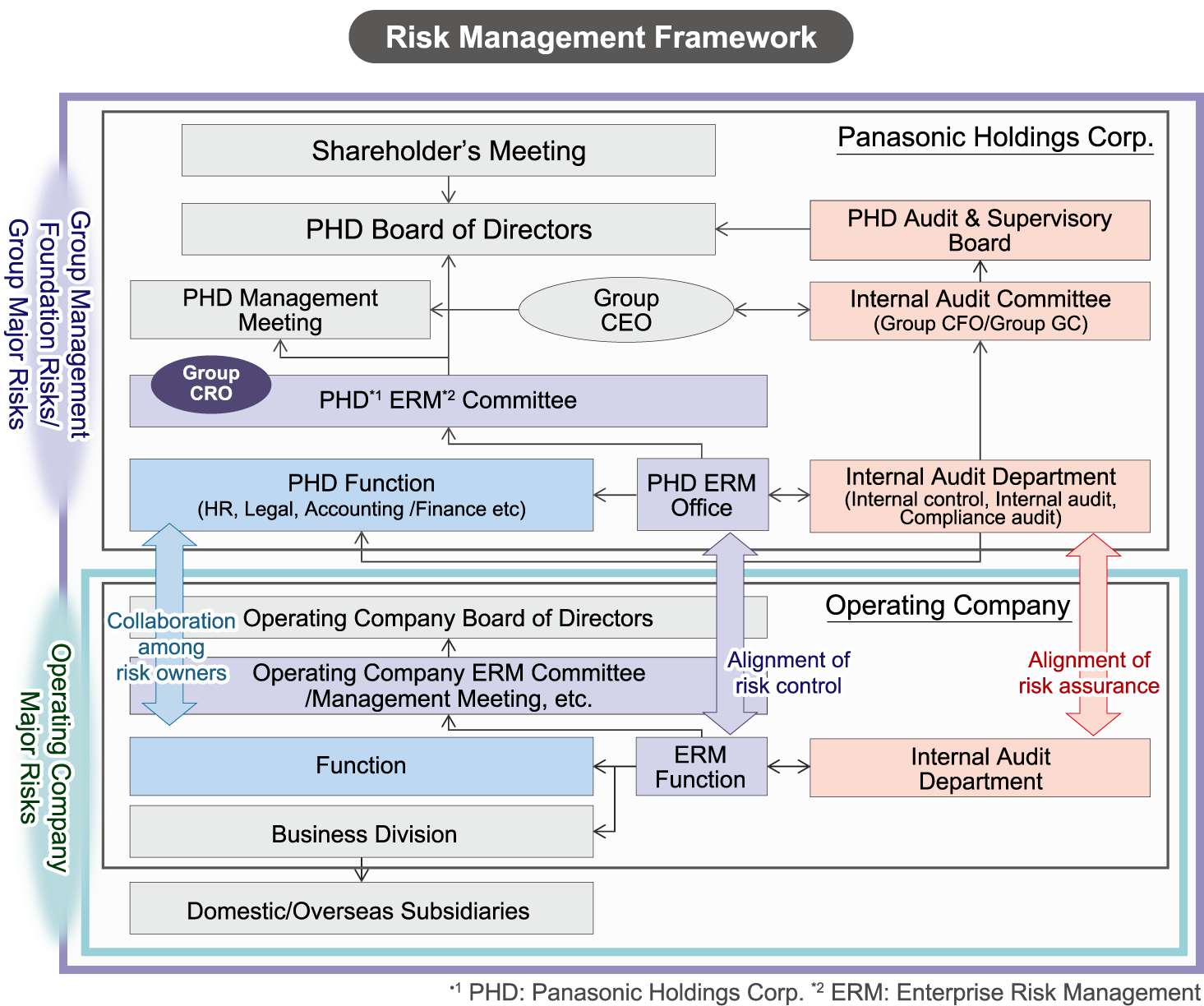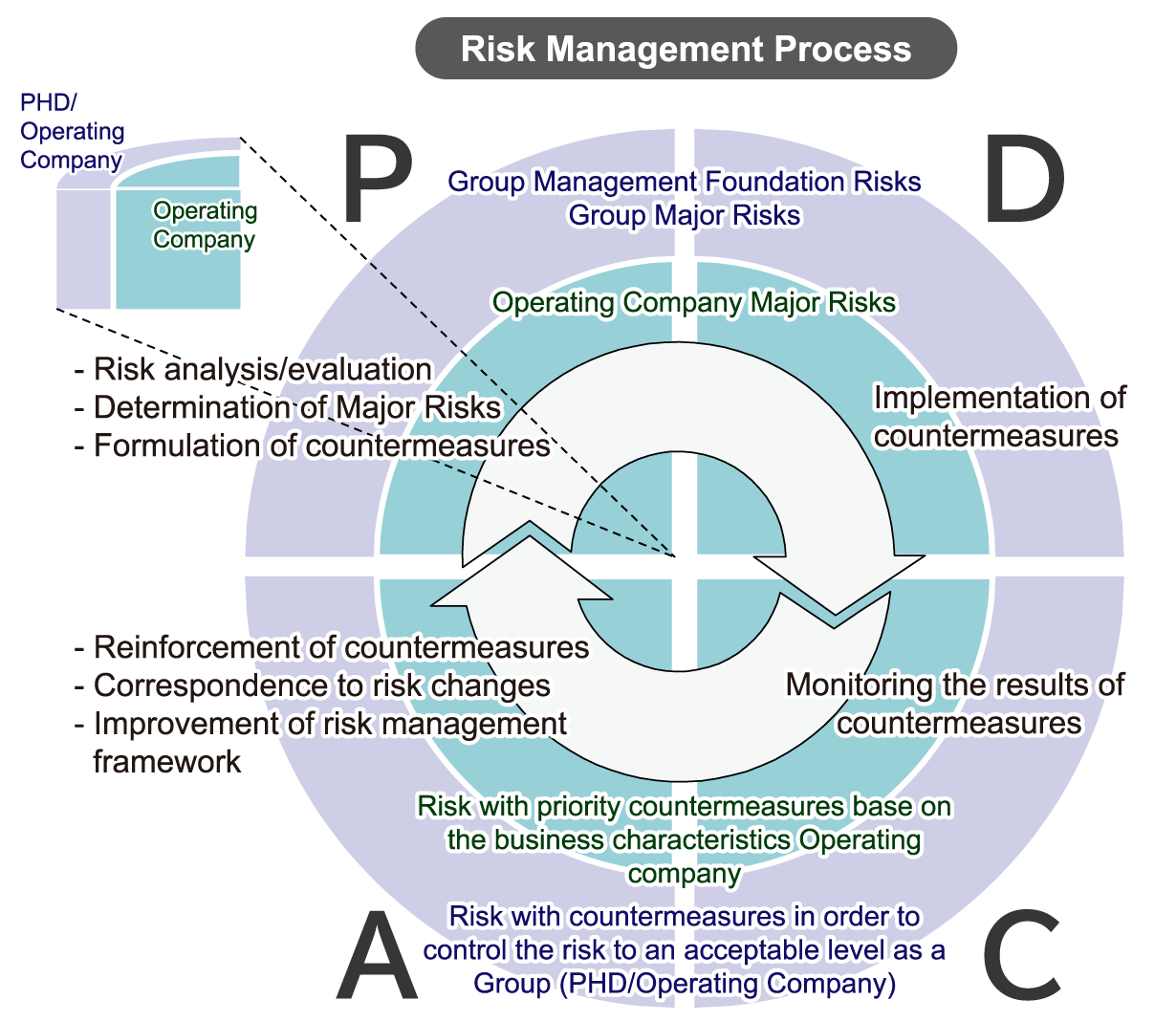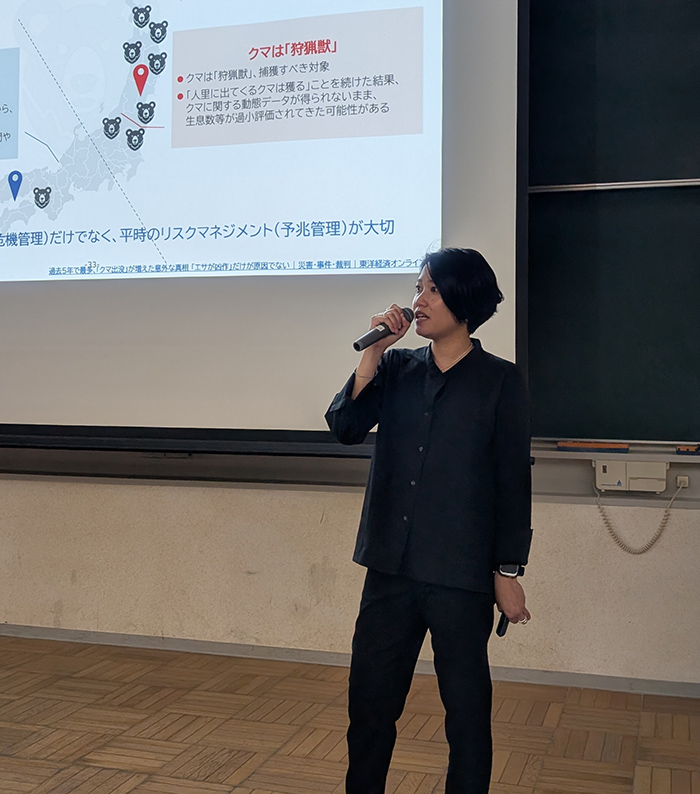Panasonic’s founder, Konosuke Matsushita, coined numerous aphorisms which are still used at the company: “Hardship now, pleasure later,” “There are signs before all things,” and “Small things can create big problems; one must be alert to signs of change and act accordingly,” among many others. Inheriting these ideas as the cornerstone of our thinking, we, as Panasonic Group, conduct Groupwide risk management activities.
Moreover, based on the principle of “Thinking from a Global perspective, work for the whole world,” we began our export business, technical assistance to overseas countries, and construction of overseas factories in 1961. At the same time, while confronting the risks that sometimes arose, we have promoted risk and crisis management initiatives early, including overseas safety policies and emergency response plans.
Policy
The Group has a wide range of businesses, including Lifestyle, Connect, Industry, and Energy Segments, and faces a variety of risks that could affect each of these business activities. We aim to enhance the competitiveness of each business in its respective market and achieve sustainable and stable growth for the entire Group by promoting appropriate countermeasures and risk-taking that may affect the achievement of our business objectives.

Panasonic Group values a Risk Culture in terms of its organizational awareness and behavior toward risk, aiming to enhance its risk management effectiveness (see “Education and Awareness” below). We aim to build on this cultural orientation to ensure that we adequately incorporate responses to changes in the business environment into our strategies and operations.
Responsible Executive and Framework
The Group has established a Groupwide risk management system and processes based on the “Panasonic Group Basic Rules for Risk Management” (the “Basic Rules”), which comply with ISO 31000, an international standard for risk management systems, and COSO-ERM (2017), an international framework for risk management.
The Group Chief Risk Management Officer (Group CRO) is responsible for promoting risk management throughout the Group. Moreover, the Enterprise Risk Management Office at Panasonic Holdings Corporation (“PHD ERM Office”), a dedicated risk management department, manages the practical operations of the Group’s risk management processes.
We have also established the PHD Enterprise Risk Management Committee (the “PHD ERM Committee”), which holds regular meetings chaired by the Group CRO and comprising the heads of PHD Legal, Human Resources, Accounting, and other functional departments. The PHD ERM Committee focuses on risks that could have a significant impact on the Group’s management. It monitors changes in risks and countermeasures, and confirms the risks are effectively controlled. If necessary, it issues directives on revisions or stricter implementation of countermeasures.

Basic Framework
The Group defines risk scenarios for the purpose of risk management, based on their respective scope and time horizon. Any uncertain events that could result in “Loss” or “Threat” to the execution of short-term business plans and daily operations are defined as “Operational Risks”, and while uncertain events that could result in “Opportunities” or “Threats” to be considered in execution of medium- to long-term business objectives are defined as “Strategic Risks”. The PHD ERM Office annually identifies risks that could impact the entire Group considering in the external and internal environmental changes, as well as management’s risk awareness.
Among the identified risks, Operational Risks are assessed by the relevant functional departments based on their likelihood of occurrence and the associated financial and non-financial impacts. The PHD ERM Committee determines “Group Management Foundation Risks” and “Group Major Risks” from the perspective of the Group’s management and social responsibilities, and the relevant functional departments take any necessary countermeasures. For Strategic Risks, in view of promoting appropriate risk-taking aligned with the Group’s risk tolerance, the relevant functional departments identify and evaluate events that could result in “Opportunities” or “Threats” or both, based on key agenda scenarios positioned as “PHD Major Strategic Risks”.
Among events, those with low uncertainty are immediately subject to countermeasures. For other events, leading indicators established to detect early signs of occurrence, allowing for the consideration of countermeasures in response to changes in uncertainty. The PHD ERM Office monitors changes in risks and the progress of countermeasures to confirm the effectiveness of risk control efforts.
The PHD ERM Committee regularly reports on material risks and the progress of countermeasures to the Group Management Meeting and the Board of Directors. Each Operating Company under the jurisdiction of PHD has also established an “Operating Company ERM Committees” to promote risk management activities focusing on important risks for each company and in their respective business areas. The Internal Auditor conducts risk-based approach audits focusing on critical risks.
In recent years, in light of the growing importance of corporate social responsibility (CSR), SDGs, ESG, and other social expectations, we have incorporated into our activity framework items related to risks arising from failure to meet these expectations (including human rights and labor compliance or environmental issues) and evaluation factors related to the Group’s social impact (e.g., our reputation).

Group Major Risks in Fiscal 2026
* Group Management Foundation Risks: Risks expected to be of high importance to the Group’s management and business foundations
Risk factors | Risk scenarios | Key initiatives |
|---|---|---|
Disasters & accidents* |
| ― |
Compliance* |
| “Compliance” |
Information security & cybersecurity* |
| “Cyber Security and Data Protection” |
| ||
| ||
| ||
Quality* |
| “Raising Product Quality Levels and Ensuring Product Safety” |
Terrorism, war, civil unrest & political instability |
| ― |
Occupational accidents |
| “Maximizing the potential of diverse talent and organizations” |
| ||
Human rights & labor compliance |
| “Respect for Human Rights” |
PHD Major Strategic Risk in Fiscal 2026
Risk factors | Risk scenarios | Key initiatives | |
|---|---|---|---|
Geopolitical & economic security | Threats |
| ― |
Opportunities |
| ||
Environmental issues & climate change | Threats |
| “Environment” |
Opportunities |
| ||
Attracting, acquiring & retaining human resources | Threats |
| “Maximizing the potential of diverse talent and organizations” |
Opportunities |
| ||
Effective utilization of artificial intelligence (AI) | Threats |
| “AI Ethics” |
Opportunities |
| ||
Education & Awareness
The Group is promoting initiatives to foster a Risk Culture where each employee possesses appropriate risk literacy and is committed to sound risk-taking. Training programs for new employees and those preparing for overseas assignments (in the Japan region) is designed to help participants develop the mindset necessary to avoid excessive fear of risks and to turn them into opportunities for organizational and personal growth. The training also aims to equip participants with basic response skills in the event of a crisis.
As part of our corporate social responsibility, we conduct external lectures titled “Risk Management that Supports Organizational and Individual Growth” at universities to help develop the young people who will lead the future through risk management.

Reporting/Whistleblowing Mechanism (External and Internal)
The Group maintains a global hotline to allow domestic and overseas bases and business partners to report potential risks, including compliance violations, diverse types of harassment, and issues related to procurement activities. For more details, please see the “Compliance” chapter.
BCM • BCP
The Group is committed to enhancing operational resilience through business continuity management (BCM) activities to ensure business continuity in the event of crises such as natural disasters, terrorism, war, pandemics, and cyberattacks.
We have established basic policies, organizational structures, roles, and initial response measures for emergencies that could significantly impact the entire Group, as outlined in the “Panasonic Group Emergency Response Rules”. We also conduct annual Group disaster drills and work to strengthen disaster prevention and mitigation measures in normal times, thereby bolstering the effectiveness of emergency response systems and coordination based on these regulations.
Moreover, we implement risk-based measures at the Group and in our Supply Chain based on hazard studies of natural disasters (e.g., earthquakes, floods, and tsunamis). We have also conducted impact analyses using the Nankai Trough Earthquake and the Tokyo Inland Earthquake as stress events with high likelihood, assuming these natural disasters will have a particularly severe impact on the Group’s business. We are improving measures deemed necessary based on the analysis results.
Finally, the Group is working to continuously enhance the entire Group’s resilience by deploying the Guidelines for Building Business Continuity Management (BCM). These guidelines outline the approach to identifying priority businesses for recovery in the event of an emergency and establishing business recovery processes. We also encourage each Operating Company and business site to formulate and appropriately revise their business continuity plans (BCPs).



